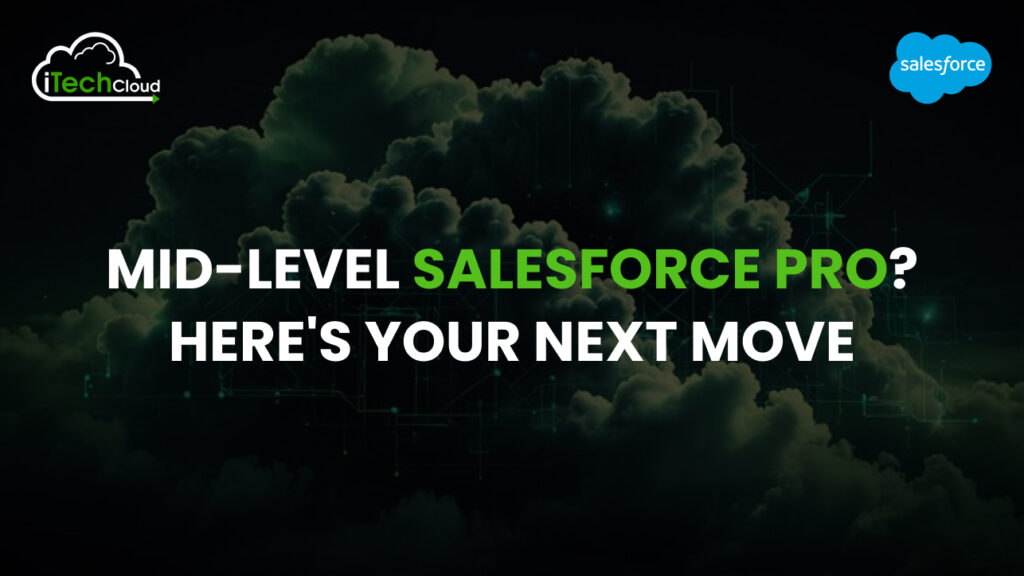Mid-Level Salesforce Pro? Here’s Your Next Move

Introduction
If you’re a mid-level Salesforce professional, you’ve likely mastered the basics custom objects, workflows, process builder, and maybe even some Lightning components. You’re comfortable with administration, maybe even dabbled in development or consulting. But now, you’re wondering: What’s next?
The Salesforce ecosystem is vast, with endless opportunities for growth. Whether you want to specialize further, move into leadership, or expand into adjacent roles, this guide will help you navigate your next career move.
Table of Contents
1. Assess Your Current Skills & Interests
Before jumping into certifications or new roles, take stock of your skills:
- Administration: Are you proficient in advanced security settings, complex automation, and integrations?
- Development: Do you know Apex, LWC, or integrations with APIs?
- Consulting: Can you translate business needs into Salesforce solutions?
- Industry Knowledge: Do you understand specific verticals (e.g., healthcare, finance, nonprofit)?
Ask yourself:
- Do you enjoy problem-solving and coding? → Consider development.
- Do you like optimizing processes and working with stakeholders? → Move toward architecture or consulting.
- Are you interested in analytics? → Explore Salesforce Einstein or Tableau CRM.
2. Deepen Your Expertise with Advanced Certifications
Salesforce certifications validate your skills and open doors. Here’s a roadmap based on your goals:
A. For Salesforce Admins Looking to Level Up
- Advanced Administrator Certification – Covers complex security models, automation, and app deployment.
- Platform App Builder – Focuses on declarative app development.
- Sales Cloud or Service Cloud Consultant – If you specialize in sales or support processes.
B. For Those Leaning Toward Development
- Platform Developer I & II – Covers Apex, Lightning Web Components, and advanced integrations.
- JavaScript Developer I – Useful for modern Salesforce front-end development.
C. For Aspiring Architects
- Data Architecture & Management Designer – Master data modeling and governance.
- Integration Architecture Designer – Learn middleware (MuleSoft) and API strategies.
- Application or System Architect – The pinnacle for solution designers.
D. For Analytics & AI Enthusiasts
- Tableau CRM & Einstein Discovery Consultant – Dive into predictive analytics.
- Marketing Cloud Consultant – If you’re into customer journeys and automation.
3. Transitioning into New Roles
A. From Admin to Developer
- Learn Apex, JavaScript, and Lightning Web Components.
- Contribute to open-source Salesforce projects on GitHub.
- Build custom apps and publish them on AppExchange.
B. From Admin to Consultant
- Develop strong requirements-gathering and stakeholder management skills.
- Get Sales Cloud or Service Cloud Consultant certified.
- Work on end-to-end implementation projects.
C. From Developer to Architect
- Focus on scalability, integration patterns, and governance.
- Earn Solution Architect certifications.
- Mentor junior team members to build leadership skills.
D. From Technical Roles to Leadership
- Move into Salesforce Team Lead or Manager roles.
- Develop project management (Agile, Scrum) and budgeting skills.
- Consider CTO or VP of Technology tracks in the long run.
4. Expand Beyond Core Salesforce
A. Learn Complementary Technologies
- MuleSoft – For API-led connectivity.
- Tableau – For advanced analytics.
- CPQ (SteelBrick) – If you’re in sales operations.
- Vlocity/OmniStudio – For industry-specific solutions.
B. Get into the Salesforce Ecosystem
- Become a Trailhead Ranger and contribute to the community.
- Speak at Dreamforce or local user groups.
- Write blogs or create YouTube tutorials.
5. Salary & Career Growth Expectations
Your earning potential grows with expertise:
- Mid-Level Admin: 90K–90K–120K
- Senior Admin/Consultant: 110K–110K–140K
- Developer: 120K–120K–150K
- Solution Architect: 150K–150K–200K+
Freelancers and independent consultants can charge 80–80–150/hour, depending on niche expertise.
6. Staying Relevant in a Changing Market
Salesforce evolves rapidly. Stay ahead by:
- Following Salesforce release notes (3x yearly updates).
- Joining Salesforce Ohana Slack groups and forums.
- Experimenting with AI & Einstein features.
Conclusion: Your Next Steps
- Audit your skills – Identify gaps and interests.
- Pick certifications that align with your career goals.
- Transition into new roles – Developer, Architect, Consultant, or Leader.
- Expand your tech stack – MuleSoft, Tableau, CPQ, etc.
- Engage with the community – Networking = opportunities.
The Salesforce ecosystem rewards those who keep learning. Whether you want to specialize deeply or branch out, your next move starts today.

